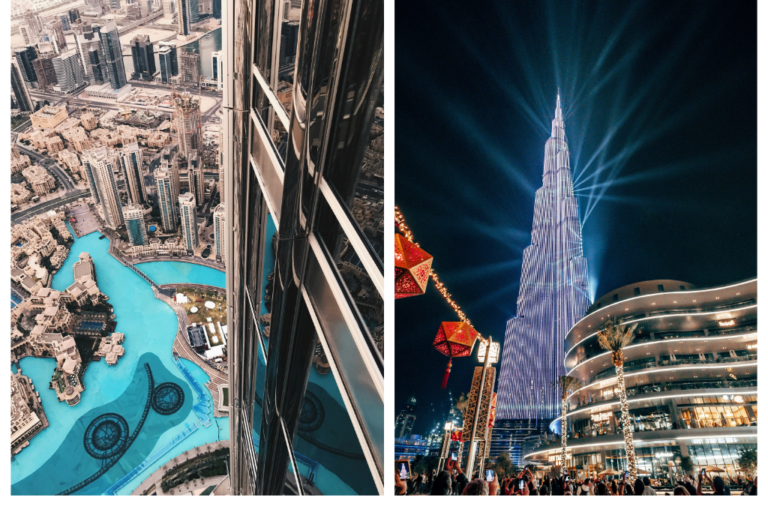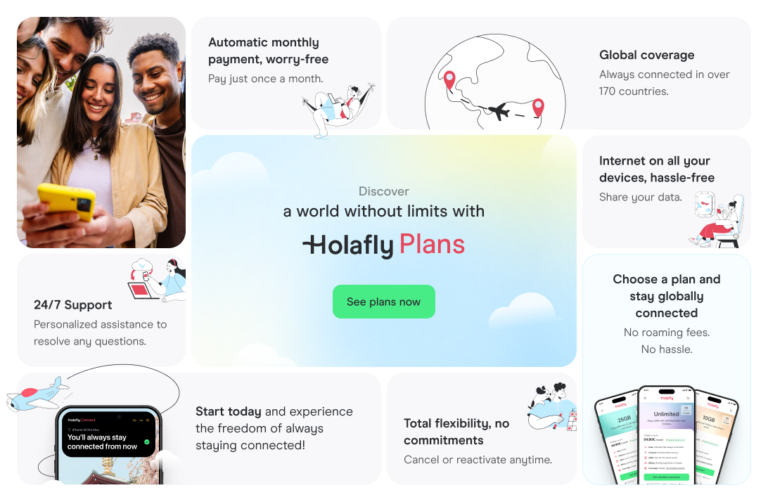Work in Dubai: Learn about opportunities and requirements
Find out everything you need to know about work in Dubai: Requirements, salaries, types of jobs and how to find opportunities in 2025.
Work in Dubai has become an increasingly attractive option for professionals around the world, especially expats seeking new career opportunities, financial stability, and a vibrant multicultural lifestyle. With key sectors like construction, technology, tourism, and healthcare experiencing rapid growth, choosing to work in Dubai can be a smart choice.
In this article, we’ll walk you through everything you need to take the first step: the benefits of working in Dubai, the requirements, practical tips to get started, the types of jobs available for expats, the most in-demand sectors, and where to find real job opportunities. You’ll find everything you need to know before starting this exciting journey.
Advantages of working in Dubai
- Zero or very low taxation: Dubai does not levy tax on personal income, capital gains or wealth. It only charges a VAT of 5% on goods and services.
- Competitive salaries and corporate benefits: Skilled professionals are often offered generous compensation packages that include tax-free salaries, health insurance, housing, transportation, annual flights, and bonuses.
- High standard of living and modern infrastructure: The city boasts a high-quality healthcare system, efficient public transportation, specialized hubs like Internet City and Healthcare City, and a highly developed urban environment.
- Multicultural environment: With such a rich mix of cultures from over 200 countries, working in Dubai opens doors to building global connections and enhancing your international career.
- Security and regulatory compliance: Crime rates are low, thanks to a strong legal system and strict regulations, making the country a safe and stable place to live and work.
- Economic stability: With a diversified economy, steady GDP growth, and free zones offering tax incentives like unrestricted capital flow for businesses, Dubai stands out as a strong destination for both employment and entrepreneurship.
- Facilities for expats and entrepreneurs: Specialized visas for employees, investors, and entrepreneurs (valid for 3 to 10 years) along with capital repatriation policies make it easier to live and establish yourself in Dubai.
Requirements to work in Dubai
Starting a job in Dubai means navigating certain formal requirements that differ based on your role, experience, and nationality. Here’s a rundown of the essential points every foreign professional should be aware of before diving into the local job market.
Types of visas that allow you to work in Dubai
- Standard work visa (sponsored by an employer): This visa is the standard choice for most workers. It requires a job offer from a company in Dubai, which handles your entry and residency sponsorship. Once you arrive, you’ll complete a health screening, submit biometric data, and get your Emirates ID set up.
- Green Visa: This visa is tailored for freelancers and self-employed professionals, allowing you to live and work in Dubai without needing a company sponsor. It’s valid for five years but requires proof of financial stability, relevant qualifications, and a service contract.
- Golden Visa: This visa targets top-tier talent, investors, researchers, entrepreneurs, and those with exceptional accomplishments, granting a 10-year residency in the UAE and extended benefits for both the individual and their family.
Remember that all these visas require legalized documentation, medical examinations and registration in the identity system.
Work permit
Once your visa is approved, your employer needs to obtain a work permit from the Ministry of Human Resources and Emiratization (MOHRE). The type of permit varies based on your contract—whether it’s full-time, part-time, temporary, or remote. The permit becomes valid only after you meet health requirements and receive your Emirates ID.
Necessary documentation
- Passport with at least 6 months of validity.
- Signed work contract.
- Passport type photographs.
- Academic degrees and professional certificates, translated into English or Arabic and legalized/apostilled.
- Application form for work permit (processed by the employer or authorized manager).
- Medical certificate issued by an authorized center in Dubai.
- Emirates ID (mandatory document to reside and work in the United Arab Emirates).
Required language level
- English is the primary language used across most industries, including tourism, technology, finance, healthcare, and trade. A solid intermediate to advanced level (B2 or higher) is generally expected.
- Arabic: Even though it’s not mandatory for many roles, knowing some basics can give you an edge, particularly in public service, customer support, or admin jobs that deal directly with the local community.
Compulsory medical examination
As a foreigner, you’ll need to undergo an official medical exam upon arriving in Dubai. This includes blood tests and X-rays to screen for conditions like HIV and tuberculosis. A clear result is essential to get your residency approved and finalize your work permit.
Health insurance
Health insurance is mandatory in Dubai, and in most cases, employers are responsible for providing it. Without this coverage, you won’t be able to complete your residency process or access proper medical care.
Minimum age and academic requirements
- You must be at least 18 years old to be able to work legally.
- For skilled positions, you’ll need to provide academic certificates to verify your qualifications. For unskilled jobs, proven experience is often enough, though requirements can vary depending on the employer.
Requirements according to country of origin
The steps are mostly the same regardless of nationality, but some documents—like your educational certificates or background checks—may need official legalization and translation into English or Arabic. This depends on the specific agreements between the UAE and your home country.
Tips to start working in Dubai

Prepare yourself before traveling: Before moving, do thorough research on Dubai’s job market. Focus on the industries that best match your skills and explore specialized job platforms. Knowing your career goals clearly will save you time and boost your chances of success. Also, if you work for a multinational company, think about requesting an internal transfer to their Dubai office.
Make sure you have a good connection from the beginning: Having internet access from day one is vital for staying connected, managing your work, and handling immigration paperwork. We recommend getting a Holafly eSIM with unlimited data, which you can activate as soon as you arrive. This way, you’re online immediately, avoid roaming charges, and can keep using WhatsApp as usual.
Prepare your documents and professional profile: Be sure to have all your documents ready: like a valid passport, officially certified diplomas, an updated English resume, and a cover letter that fits the local expectations. In Dubai, a polished professional image and clear presentation of your skills go a long way. Also, consider boosting your LinkedIn presence by enabling ‘Open to Work’ and connecting with regional professional networks.
Plan your first days with flexibility: In your first weeks, it’s smart to choose temporary housing that lets you adjust at your own pace. Opt for places in central areas with easy transport access to simplify essential errands like obtaining your Emirates ID, completing mandatory medical exams, and setting up a local bank account.
Learn about the work and social culture: Working in Dubai means stepping into a multicultural environment with its own set of expectations. Get to know the local etiquette, how to dress in professional settings, the Sunday-to-Thursday workweek, and what to expect during Ramadan. The more open and respectful you are, the richer your experience will be.
Getting involved in expat events, professional meetups, or online communities is a great way to settle in, explore job leads, and get practical advice. Dubai’s international scene is vibrant and welcoming and can really help you adjust, both personally and professionally.
Type of jobs in Dubai for foreigners
From hands-on roles in construction and hospitality to high-level positions in tech and business, Dubai is packed with career opportunities for foreign professionals. Below is a breakdown by sector, with examples and role descriptions to help you explore your options.
- Services and hospitality: With tourism thriving in Dubai, roles like hotel receptionists, restaurant staff, and hospitality assistants are in constant demand. If you’re good with people and speak English well (bonus points for extra languages), you’ll have a clear edge. Major events and expos also bring opportunities for short-term gigs in guest registration, support, and logistics.
- English teachers (TEFL): If you have a TEFL certification, you can teach in schools, language centers, or even offer business English to professionals. These positions often come with added perks like housing, flights, or health insurance.
- Offices and corporate sector: Dubai’s corporate sector is full of opportunities for international professionals, especially in roles that keep companies running smoothly (admin support, HR, finance, and accounting). There’s also a growing need for digital talent, with companies regularly hiring SEO specialists, developers, and cybersecurity experts as the region’s tech scene continues to expand
- Health: International hospitals and clinics require nurses, specialists and technicians.
- Construction and engineering: There’s strong demand for engineers, technicians, and document controllers, particularly in civil engineering, project oversight, and machinery operation, all fueled by Dubai’s rapid growth in real estate and infrastructure.
- Technology, logistics and transportation: There’s a strong need for professionals in IT infrastructure, app development, and cybersecurity. Meanwhile, the logistics sector seeks operators, dispatch coordinators, and transport specialists to manage the flow of goods throughout the city.
- Public sector: In 2025, job openings for foreigners included positions like Audit Manager, Air Traffic Controller, Strategy Manager, and Archival roles, offering attractive salaries of up to around $11,000 per month.
The most in-demand jobs in Dubai for foreigners
Certain jobs consistently stand out because of their strong demand and staff turnover. In the tech world, roles like software developers, cybersecurity experts, and data analysts are highly sought after by both local companies and international firms based in Dubai. The banking and corporate sectors also rely heavily on accountants, auditors, and financial analysts. Engineering roles in construction, electrical, and mechanical fields remain essential for ongoing infrastructure and urban development. Plus, sectors like education, digital marketing, and hospitality keep welcoming international talent, particularly in international schools, creative agencies, and hotel groups that appreciate diverse experience.
Salaries and living costs in Dubai
Salaries in Dubai for expats are tax-free and vary by industry and experience. On average, people earn about $4,275, which comes to around $52,000. Since there’s no income tax, these salaries are quite appealing—especially in fields like corporate, tech, healthcare, and engineering.
The salary range is wide: from $1,310 for entry-level profiles, up to 27,000/month in highly specialized positions.
Approximate monthly cost of living
To get a clear picture of what’s left from your paycheck, let’s take a look at typical expenses:
- Expenses of one person: $1,100-2,200 per month.
- Housing consumes most of it: $1,200-1,950 for a single room, even more in central areas.
- Food: $455-490
- Transportation: $210
- Utilities (water, electricity, internet): $200-330
- Medical insurance: $250
- Entertainment and extras: $320
Comparative income and expenses
If you earn around $4,275 and your monthly living expenses are about $2,150, you’d have roughly $2,125 left each month. For mid-level professionals earning between $5,400 and $8,100 a month, there’s even more room to save or support your family comfortably.
Important: If you are a frequent traveler and want to stay connected without worrying about expensive roaming or looking for a new SIM at every destination, Holafly’s subscription plans are for you. With a single eSIM, enjoy internet in more than 170 countries for a fixed price and no surprises on your bill. Travel without limits and connect easily and securely! 🚀🌍

Where to find job opportunities in Dubai?
Landing a job in Dubai requires a clear plan and determination. Below, you’ll find the main trusted paths and resources to help you get started. Specialized websites in the Emirates are frequently updated and widely used by local and international companies:
- Bayt.com: Leading portal in the Middle East with more than 40 million registered CVs.
- NaukriGulf and Monster Gulf: Featured in the Gulf region, with wide ranges of roles and useful filters.
- GulfTalent: Perfect for experienced professionals; posts thousands of vacancies in Dubai.
- LinkedIn and Indeed UAE: Essential for connecting with recruiters and applying directly to local companies.
Recruitment and hiring agencies
Regulated by the Ministry of Human Resources (MOHRE), these firms act as intermediaries between the candidate and the employer:
- TASC Outsourcing: One of the largest in the region, offers temporary, permanent contracts and visa management.
- Specialized firms in industries like finance, tech, healthcare, and hospitality often maintain exclusive job lists. Their main advantage is access to positions that aren’t always publicly advertised.
Opportunities in the public sector
Official job portals like the Federal Government Job Portal, Dubai Careers, and those of other emirates (Abu Dhabi, Ajman, Sharjah, etc.) list opportunities in government sectors and free zones. Some roles are open to foreigners and often come with work visas and attractive benefits.
Professional networking and freelancing
- LinkedIn is the reference for networking; contacts and recommendations can open real doors.
- Freelancing platforms born in the region, such as Ureed, connect translators, copywriters and creative professionals with local companies.
Frequently asked questions about how to work in Dubai
No. To work there, you need a work visa sponsored by an employer or a specific residence visa like the Green or Golden Visa.
The average monthly salary is about $4,275, though it varies by industry and role. Skilled or specialized professionals, especially in tech, healthcare, and finance, often earn significantly more.
Yes. Dubai doesn’t charge personal income tax, so you keep everything you earn. There is only a 5% VAT on goods and services.
The government designates free zones as areas with special tax and visa perks, allowing you to work or start a business independently without needing a local partner. They’re home to many foreign companies.
No, most workplaces use English as the primary language. Still, knowing some basic Arabic can give you an edge in certain industries or roles.





 Language
Language 


















 No results found
No results found





